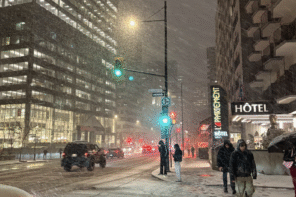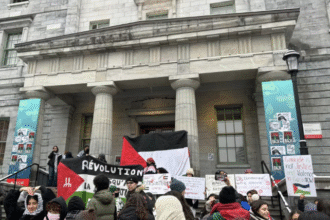The future site of the McGill student hub known as “New Vic” has become the source of a lengthy legal battle between the Mohawk Mothers and McGill University. The Kanien’keha:ka Kahnistensera, commonly known as the Mohawk Mothers, have long believed there to be a possibility of unmarked graves of both Indigenous and non-Indigenous children on the site. This belief originates from the signed affidavit of Lana Ponting, a survivor of the mind control experiments conducted at the Allan Memorial Institute, and the results of a preliminary investigation shared by archeologist Phillipe Blouin. The area, previously the grounds of Royal Victoria Hospital (RVH), was where the Allan Memorial Institute conducted MK-Ultra and mind control experiments in the 50s and 60s. From her time in the institute, Ponting remembered seeing children ages 5 to 19, some of whom were Indigenous. She also recalled seeing people standing outside at night with shovels and hearing rumors that bodies were buried on the site.
After a five-month court-mandated injunction on account of these concerns, a settlement was reached in April of 2023 allowing construction to continue on the grounds of the former Royal Victoria Hospital under the guidance of an appointed archeological panel. The site resumed co-development by McGill and the Société québécoise des infrastructures (SQI), with the help of a 620 million dollar contribution from the Quebec government. McGill hoped that the “New Vic” would model “how heritage buildings can be responsibly re-purposed” while they searched for unmarked graves.
After the investigation into the possible unmarked graves began, Historic Human Remains Detection Dogs were deployed in designated site zones to locate possible human remains. Three teams of detection dogs reported alerts in zone 6, which were concluded to be the scent of human remains by the dog’s service provider, Kim Cooper. Another alert was subsequently reported in zone 41. In light of these discoveries, McGill has questioned the success rates of the Historic Human Remains Detection Dogs survey, citing studies from 2011 and 2012 while acknowledging that various studies have indicated high accuracy rates. Despite this evidence, McGill maintains that no unmarked graves or human remains have been discovered on the site to date and that the presence of such graves remains uncertain.
The Mohawk Mothers have been concerned with McGill and the SQI’s handling of evidence and adherence to their settlement long since the detection of human remains on the site of RVH. In August of 2023, the Mohawk Mothers returned to the courts, claiming that both McGill and the SQI breached the spirit and letter of their settlement – an assertion McGill University strongly denied. Almost a month later, the Mohawk Mothers raised concerns that the forensic chain of custody was being disrupted. The chain of custody documents all movement of evidence after its collection, and if obstructed could render the evidence unusable in court. Their concerns were regarding site workers transporting piles of material to a secondary location with little explanation to the mothers, and the careless handling of evidence.
“They wanna move the piles that are unsifted to another area, stating that they need the place for work, but they are not supposed to continue with work until we have determined where those remains have come from, that smell that the dogs detected.” Kwettiio, a Mohawk Mother, stated during an interview with City News. “We find another child’s shoe in there,” Kwettio stated, “but they just tossed it aside. It was sitting right on top.” Anthropologist Philippe Blouin also expressed his thoughts during an interview with Global News, stating “It’s been pretty chaotic from what I understand on the site, some things are done, some things are not done.”
In response, the SQI stated that the piles were carefully being moved at the request of the archeologists and that the material in the zones underwent manual excavation, sifting, ground-penetrating radar, and analysis in the search for unmarked graves. McGill asserted that Ethnoscop, the archeological and cultural heritage consultants hired to analyse the findings, maintained a complete chain of custody. Both McGill University and the SQI have maintained that the Mohawk Mothers were kept fully informed and that the settlement was being honoured.
Despite public assurances that they were honouring the settlement, McGill and the SQI were taken to court again in November of 2023 and were ordered to abide by a rectified settlement agreement and to work under the guidance of the appointed archeological panel. This court decision was later appealed by McGill, and would be overturned in August of 2024. The Mohawk Mothers have gone to the Supreme Court to appeal this decision, calling on the court to reinstate the panel of experts.
On October 15th, during the Mohawk Mothers’ press conference announcing their decision to go to the Supreme Court, the handling of evidence and previous commitment to the settlement by McGill and the SQI was again brought into question. Kimberly Murray, an independent special interlocutor for Missing Children and Unmarked Graves and Burial Sites, stated “When we found bones, when we had human remain detection dogs scent human remains, when we found shoes of children – everything was getting shut down.” Kwetiio adds to Murray’s concerns, stating that McGill and the SQI were “Cherry-picking the panel’s recommendations, respecting the ones that seemed convenient and rejecting others.” She continued by saying that “We have had enough of the government trying to give us the runaround when we try to defend our rights… Enough of waking up prepared for this next government initiative designed to get rid of us.”
In response, McGill claims that the panel dissolved after its stipulated mandate was carried out, as intended. They confirmed that no unexpected discoveries have been made, but if this changes, the settlement specifies they receive guidance from the panel on how to proceed. The SQI maintains that they have fully complied with the settlement and have done so rigorously and in good faith.
The Mohawk Mothers continue to call for justice, maintaining that this is of national importance. If the motion moves forward with the Supreme Court, the decision could set a precedent for protecting the burial grounds of Indigenous ancestors and could be a step towards reconciliation. Both McGill University and the Mothers await news on whether the motion will proceed with the court.








